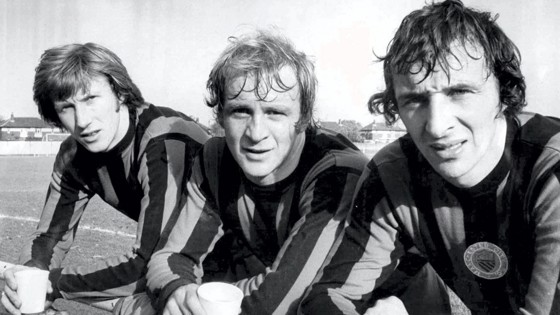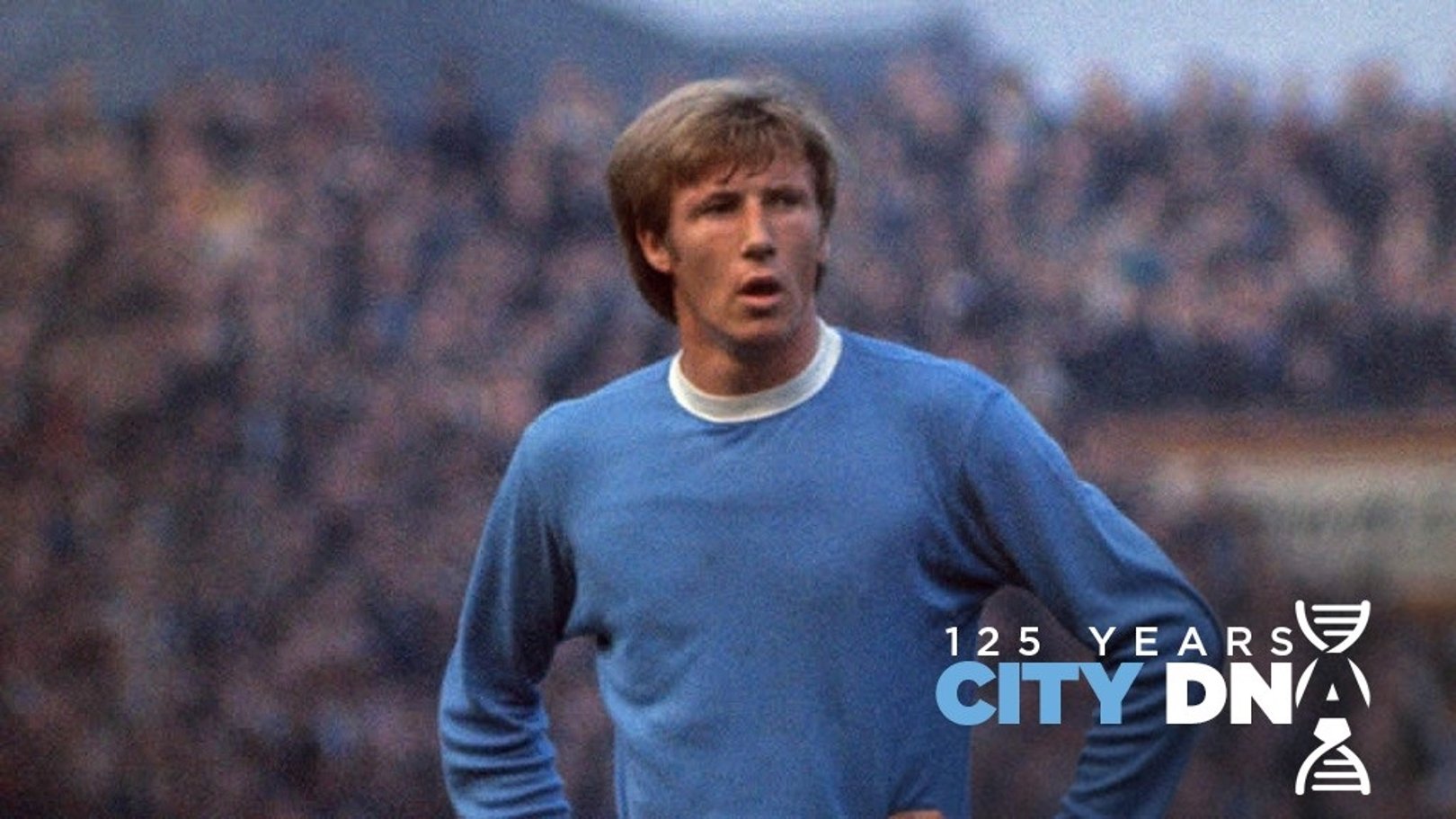Kevin De Bruyne, David Silva, Sergio Aguero… the list goes on.
But rewind 50 years and there was little argument about who City’s greatest player was… Colin Bell.
READ: Who was Billy Telford?
Alongside today’s modern-day legends, Bell remains a contender for City’s greatest all-time player, and with good reason - though it took a clever bit of mind games from Malcolm Allison to ensure Bell became a City player in the first place.
Allison sat in the stand at Gigg Lane loudly expressing his doubts over Bury’s prized asset Colin Bell.
Big Mal questioned every aspect of the 20-year-old’s ability.
“He can’t pass it,” he’d say absently (but just loud enough for those sat nearby to hear); “He can’t tackle and he’s no good in the air,” he continued.
Whether anyone was fooled by this is unknown, but it might just have bought some time with City snapping up Bell once the cash had been raised to buy him.
At £47,500, Bell – who had scored 25 goals in 83 games for the Shakers – cost around £750,000 in today’s money and was worth every penny plus much more.
Wearing the No. 10 shirt, he made his debut against Derby County and scored one of the goals in a 2-1 win. He played in all 11 remaining games during which City didn’t lose a match and picked up the Division Two championship for good measure.
Signing Bell was already proving a resounding success just two months into his career at Maine Road.
Bell was an ever-present during his first full season and finished top scorer with a dozen goals as the Blues limped to a final placing of fifteenth in the table, but that was merely the warm-up for the incredible years ahead.
Though he changed shirt numbers during his first 18 months, the No.8 jersey would eventually become his own and with a full top flight campaign under his belt, he set about shifting up another gear, as did many of his team-mates.
Francis Lee had joined the club partway through the 1967/68 season and for many, this represented the final piece of the Mercer-Allison jigsaw.

City won the league title for the first time in 31 years with Bell inspirational throughout the campaign. He was here, there and literally everywhere and the fans loved his incredible athleticism and seemingly limitless stamina and in a team of winners, he was an easy choice for the 1967/68 Manchester City Player of the Year.
He was the beating heart of the team and along with Lee and Mike Summerbee, formed the legendary ‘Holy Trinity’ of players who would inspire the club to as yet uncharted heights.
Bell also won his first England cap in 1968 – the first of 48, which for several decades, was a club record.
He never scored winning goals in cup finals and rarely took the headlines for being anything other than brilliant – not unlike David Silva today, though he bore more similarities to the playing style of Kevin De Bruyne. He was a fantastic footballer and a quiet man off the pitch, too, never seeking adulation or press coverage, even though he’d more than earned it. In fact, he positively shunned the limelight.
While Summerbee, Lee and Doyle would wind-up the opposition, the press and opposing fans, Bell quietly ticked along in the background, painfully shy, preferring to let his feet do the talking – and how they talked!
Fittingly, he earned the nickname of a thoroughbred horse (and world renowned ballet dancer) ‘Nijinsky’ and the City fans chanted he was ‘Colin the King’ to the famous hit of the time ‘Lily the Pink’.
He was to Manchester City what George Best was to Manchester United – the golden boy, the untouchable, the prodigal son. As the years ticked by, Bell’s influence seemed to grow even stronger rather than fade and while the press and pundits harshly claimed Rodney Marsh’s signing cost City the 1971/72 league title, few noted that Colin Bell had missed nine games through injury and City won just four of those matches.
Bell was fantastically loyal to City and there was never the slightest suggestion that he would ever leave the club. Undoubtedly, every top club in Europe coveted the Blues’ No.8 but as the successful late sixties team slowly began to fragment, Bell powered on missing just three league games in three-and-a-half seasons.
Then came the infamous 1975 League Cup tie with Manchester United and the moment indelibly etched in the minds of all who witnessed it. Bell, attacking the Platt Lane end of Maine Road, was caught in two minds as to what to do as he approached Martin Buchan on the edge of the Reds’ box. He opted to cut inside and was strongly challenged by the United man, with the impact effectively destroying his knee joint and, in reality, ending his career.
He did come back later that season and was again on the end of a nasty challenge, this time from Ray Kennedy as the Blues beat Arsenal 3-1 at Maine Road – that injury was, many believed, equally as damaging as Buchan’s challenge. He was sidelined for the next 18 months doing everything he possibly could do work his way back to fitness.
Quietly and stoically, he continued the long, painful road back to some kind of fitness, pounding the streets around Maine Road as some mobility returned before he was finally passed fit to begin training again.
He was forced to miss the entire 1976/77 season, with Tony Book’s side finishing second to Liverpool by a single point – few doubted that with a fully-fit Colin Bell, the title would have been coming back to Maine Road that season.
But with medical science back then a long way from today’s methodology and thinking, he stood little chance of resuming the career he had once had.
He made an emotional comeback against Newcastle United as a second half sub on Boxing Day 1977 and received perhaps the most emotional ovation ever witnessed at Maine Road as a crowd of more than 45,000 stood as one to salute his sheer bloody mindedness and determination to overcome the odds that had been stacked against him.
Bell’s appearance that day galvanised his team-mates and the crowd and City scored four goals to win the game 4-0.
He played sporadically after that but, understandably, he was never the same again, with the injury making the free-flowing running style that was a huge part of his game look awkward and painful.
His bravery, though, was admired by all in football and at City, he was revered like no other player before him.
Ultimately,, the pain and heartache of never being able to move fluidly on a pitch again forced his retirement with his final appearance coming as a sub against Aston Villa in May 1979 aged 33.
He played 492 times for City and scored 152 goals – an injury free Bell would have no doubt played well over 600 games and probably scored 200 goals.
Though he briefly tried his hand in the USA, his playing days were effectively over and after officially handing his boots up. he returned to City as part of the youth team set-up for a time and after being awarded the MBE in 2004 for his services to football and the Club recognised his contribution by naming a City of Manchester Stand ‘The Colin Bell Stand’ that same year.
A true Manchester City legend in every sense of the word.







